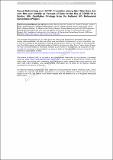| dc.contributor.author | O’Cleirigh, Conall | |
| dc.contributor.author | Foley, Jacklyn D. | |
| dc.contributor.author | Stanton, Amelia M. | |
| dc.contributor.author | McKetchnie, Samantha M. | |
| dc.contributor.author | Gulbicki, Lauren R. | |
| dc.contributor.author | Muten, Jennifer | |
| dc.contributor.author | Chai, Peter | |
| dc.contributor.author | Fitch, Calvin | |
| dc.contributor.author | Onofrey, Shauna | |
| dc.contributor.author | Klevens, R. M. | |
| dc.contributor.author | Psaros, Christina | |
| dc.date.accessioned | 2025-06-23T19:50:35Z | |
| dc.date.available | 2025-06-23T19:50:35Z | |
| dc.date.issued | 2024-01-02 | |
| dc.identifier.uri | https://hdl.handle.net/1721.1/159651 | |
| dc.description.abstract | Men who have sex with men and identify as persons of color (MSM of color) are significantly impacted by HIV in the United States. The COVID-19 pandemic may have disproportionately exacerbated HIV-related disparities among MSM of color by affecting sexual networking behaviors and disrupting access to sexual health care. The current study explored the impact of COVID-19 on sexual networking and HIV/sexually transmitted infection (STI) prevention behaviors among MSM of color in Boston, MA. Eighteen semi-structured interviews were conducted via the 2020–2021 Boston sample of the National HIV Behavioral Surveillance (NHBS) project. Eligible participants were at least 18 years old, identified as a man or non-binary person assigned male at birth and as a person of color, and endorsed ever having sex with men. Interviews were coded using inductive and deductive approaches, and themes were extracted using thematic analysis. When participants were asked about the impact of COVID-19 on sexual networking and HIV/STI prevention, the following themes emerged: (1) differing interpretations of COVID-19 public health guidance, (2) behavior change to meet social and sexual needs, (3) limited or changed access to HIV/STI prevention services; and (4) avoidance of healthcare appointments. Overall, the pandemic affected sexual networking and HIV/STI prevention behaviors among MSM of color. Though changes in sexual networking varied, most participants decreased in-person networking, increased dating app use, and prioritized longer-term relationships. Despite loosening of restrictions, these impacts may persist and should inform the adaptation of sexual networking guidance and interventions to mitigate HIV-related disparities in communities of color. | en_US |
| dc.publisher | Springer US | en_US |
| dc.relation.isversionof | https://doi.org/10.1007/s10461-023-04238-2 | en_US |
| dc.rights | Article is made available in accordance with the publisher's policy and may be subject to US copyright law. Please refer to the publisher's site for terms of use. | en_US |
| dc.source | Springer US | en_US |
| dc.title | Sexual Networking and HIV/STI Prevention Among Men who have Sex with Men and Identify as Persons of Color in the Era of COVID-19 in Boston, MA: Qualitative Findings from the National HIV Behavioral Surveillance Project | en_US |
| dc.type | Article | en_US |
| dc.identifier.citation | O’Cleirigh, C., Foley, J.D., Stanton, A.M. et al. Sexual Networking and HIV/STI Prevention Among Men who have Sex with Men and Identify as Persons of Color in the Era of COVID-19 in Boston, MA: Qualitative Findings from the National HIV Behavioral Surveillance Project. AIDS Behav 28, 473–487 (2024). | en_US |
| dc.contributor.department | Koch Institute for Integrative Cancer Research at MIT | en_US |
| dc.relation.journal | AIDS and Behavior | en_US |
| dc.eprint.version | Author's final manuscript | en_US |
| dc.type.uri | http://purl.org/eprint/type/JournalArticle | en_US |
| eprint.status | http://purl.org/eprint/status/PeerReviewed | en_US |
| dc.date.updated | 2025-03-27T13:48:21Z | |
| dc.language.rfc3066 | en | |
| dc.rights.holder | The Author(s), under exclusive licence to Springer Science+Business Media, LLC, part of Springer Nature | |
| dspace.embargo.terms | Y | |
| dspace.date.submission | 2025-03-27T13:48:21Z | |
| mit.journal.volume | 28 | en_US |
| mit.license | PUBLISHER_POLICY | |
| mit.metadata.status | Authority Work and Publication Information Needed | en_US |
